
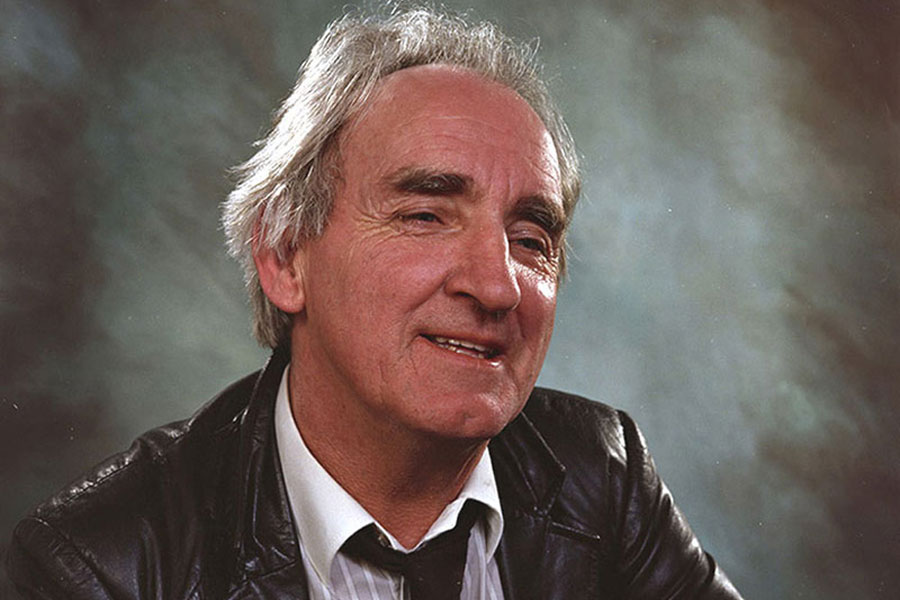
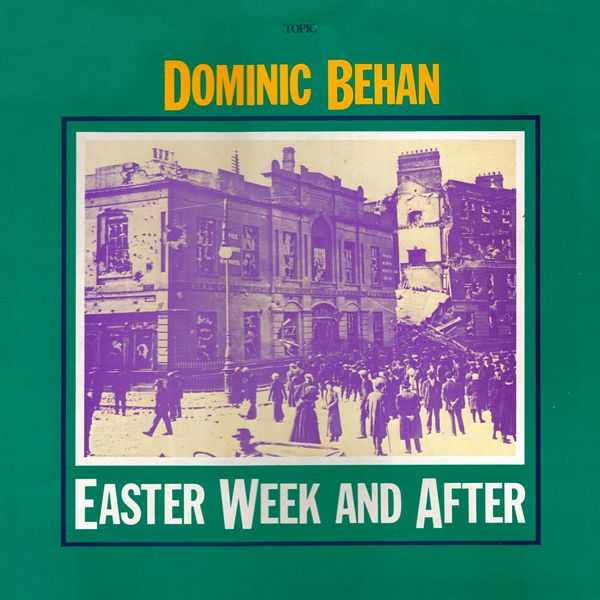 |
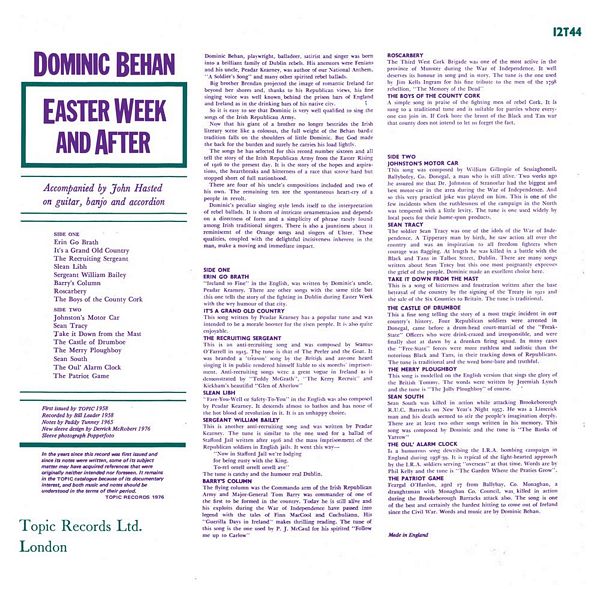
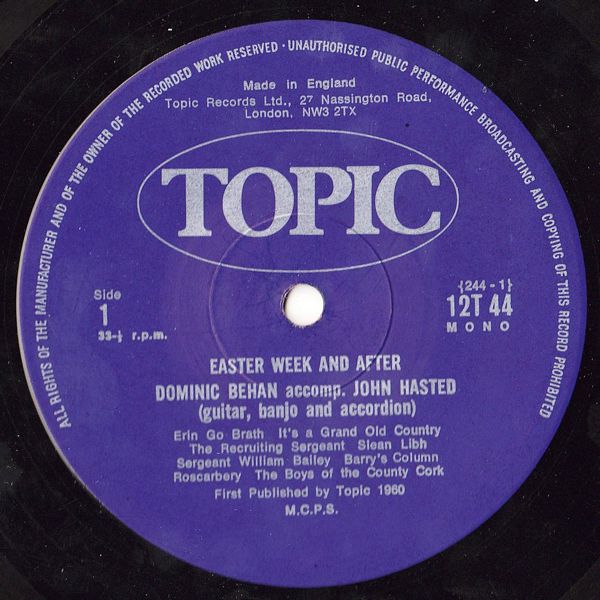
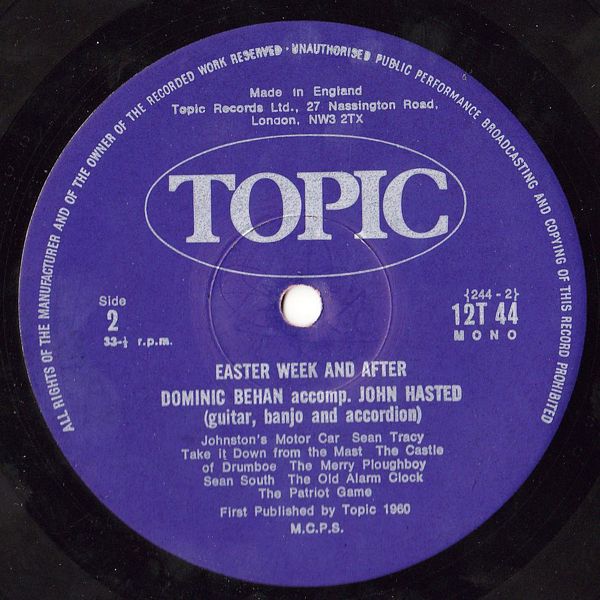 |
Sleeve Notes
In the years since this record was first issued and since its notes were written, some of its subject matter may have acquired references that were originally neither intended nor foreseen. It remains in the TOPIC catalogue because of its documentary interest, and both music and notes should be understood in the terms of their period.
TOPIC RECORDS 1976
Topic Records Ltd. London
Dominic Behan, playwright, balladeer, satirist and singer was born into a brilliant family of Dublin rebels. His ancestors were Fenians and his uncle, Peadar Kearney, was author of our National Anthem, "A Soldier's Song" and many other spirited rebel ballads.
Big brother Brendan projected the image of romantic Ireland far beyond her shores and, thanks to his Republican views, his fine singing voice was well known, behind the prison bars of England and Ireland as in the drinking bars of his native city.
So, it is easy to see that Dominic is very well qualified to sing the songs of the Irish Republican Army.
Now that his giant of a brother no longer bestrides the Irish literary scene like a colossus, the full weight of the Behan bardic tradition falls on the shoulders of little Dominic. But God made the back for the burden and surely, he carries his load lightly.
The songs he has selected for this record number sixteen and all tell the story of the Irish Republican Army from the Easter Rising of 1916 to the present day. It is the story of the hopes and aspirations, the heartbreaks and bitterness of a race that strove hard but stopped short of full nationhood.
There are four of his uncle's compositions included and two of his own. The remaining ten are the spontaneous heart-cry of a people in revolt.
Dominic's peculiar singing style lends itself to the interpretation of rebel ballads. It is shorn of intricate ornamentation and depends on a directness of form and a simplicity of phrase rarely found among Irish traditional singers. There is also a jauntiness about it reminiscent of the Orange songs and singers of Ulster. These qualities, coupled with the delightful incisiveness inherent in the man, make a moving and immediate impact.
ERIN GO BRATH — "Ireland so Fine" in the English, was written by Dominic's uncle, Peadar Kearney. There are other songs with the same title but this one tells the story of the fighting in Dublin during Easter Week with the wry humour of that city.
IT'S A GRAND OLD COUNTRY — This song written by Peadar Kearney has a popular tune and was intended to be a morale booster for the risen people. It is also quite enjoyable.
THE RECRUITING SERGEANT — This is an anti-recruiting song and was composed by Seamus O'Farrell in 1915. The tune is that of The Peeler and the Goat. It was branded a 'treason' song by the British and anyone heard singing it in public rendered himself liable to six months' imprisonment. Anti-recruiting songs were a great vogue in Ireland as is demonstrated by "Teddy McGrath ", "The Kerry Recruit" and Kickham's beautiful "Glen of Aherlow"
SLEAN LIBH — "Fare-You-Well or Safety-To-You" in the English was also composed by Peadar Kearney. It descends almost to bathos and has none of the hot blood of revolution in it. It is an unhappy choice.
SERGEANT WILLIAM BAILEY — This is another anti-recruiting song and "was written by Peadar Kearney. The tune is similar to the one used for a ballad of Stafford Jail written after 1916 and the mass imprisonment of the Republican soldiers in English jails. It went this way —
"Now in Stafford Jail we're lodging
for being rusty with the King.
To-rel orrell orrell orrell aye"
The tune is catchy and the humour real Dublin.
BARRY'S COLUMN — The flying column was the Commando arm of the Irish Republican Army and Major-General Tom Barry was commander of one of the first to be formed in the country. Today he is still alive and his exploits during the War of Independence have passed into legend with the tales of Finn MacCool and Cuchuliann. His "Guerilla Days in Ireland" makes thrilling reading. The tune of this song is the one used by P. J. McCaul for his spirited "Follow me up to Carlow"
ROSCARBERY — The Third West Cork Brigade was one of the most active in the province of Munster during the War of Independence. It well deserves its honour in song and in story. The tune is the one used by Jim Kells Ingram for his fine tribute to the men of the 1798 rebellion, "The Memory of the Dead "
THE BOYS OF THE COUNTY CORK — A simple song in praise of the fighting men of rebel Cork. It is sung to a traditional tune and is suitable for parties where everyone can join in. If Cork bore the brunt of the Black and Tan war that county does not intend to let us forget the fact.
JOHNSTON'S MOTOR CAR — This song was composed by William Gillespie of Sessiaghoneil, Ballybofey, Co. Donegal, a man who is still alive. Two weeks ago, he assured me that Dr. Johnston of Stranorlar had the biggest and best motor-car in the area during the War of Independence. And so, this very practical joke was played on him. This is one of the few incidents when the ruthlessness of the campaign in the North was tempered with a little levity. The tune is one used widely by local poets for their home-spun products.
Seán TRACY — The soldier Seán Tracy was one of the idols of the War of Independence. A Tipperary man by birth, he saw action all over the country and was an inspiration to all freedom fighters when courage was flagging. At length he was killed in a battle with the Black and Tans in Talbot Street, Dublin. There are many songs written about Seán Tracy but this one most poignantly expresses the grief of the people. Dominic made an excellent choice here. TAKE IT DOWN FROM THE MAST
This is a song of bitterness and frustration written after the base betrayal of the country by the signing of the Treaty in 1921 and the sale of the Six Counties to Britain. The tune is traditional.
THE CASTLE OF DRUMBOE — This a fine song telling the story of a most tragic incident in our country's history. Four Republican soldiers were arrested in Donegal, came before a drum-head court-martial of the "Freak-State" Officers who were drink-crazed and irresponsible, and were finally shot at dawn by a drunken firing squad. In many cases the "Free-State" forces were more ruthless and sadistic than the notorious Black and Tans, in their tracking down of Republicans. The tune is traditional and the word bone-bare and truthful.
THE MERRY PLOUGHBOY — This song is modelled on the English version that sings the glory of the British Tommy. The words were written by Jeremiah Lynch and the tune is "The Jolly Ploughboy" of course.
Seán SOUTH — Seán South was killed in action while attacking Brookeborough R.U.C. Barracks on New Year's Night 1957. He was a Limerick man and his death seemed to stir the people's imagination deeply. There are at least two other songs written in his memory. This song was composed by Dominic and the tune is "The Banks of Yarrow"
THE OUL' ALARM CLOCK — Is a humorous song describing the I.R.A. bombing campaign in England during 1938-39. It is typical of the light-hearted approach by the I.R.A. soldiers serving "overseas" at that time. Words are by Phil Kelly and the tune is "The Garden Where the Praties Grow".
THE PATRIOT GAME — Feargal O'Hanlon, aged 17 from Ballybay, Co. Monaghan, a draughtsman with Monaghan Co. Council, was, killed in action during the Brookeborough Barracks attack also. The song is one of the best and certainly the hardest hitting to come out of Ireland since the Civil War. Words and music are by Dominic Behan.
Made in England